A Psoriasis Diet to Reduce Some Symptoms
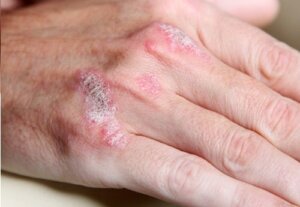

Written and verified by psychologist Valeria Sabater
Psoriasis is a skin condition that we may suffer from due to an autoimmune problem. It causes irritation and redness on our skin. This leads to white patches that, in turn, leave the skin red and scaly. In addition to the creams and medications that are commonly used to treat this disease, a healthy psoriasis diet can be a good complement.
Balanced nutrition, medication, and stress management will help reduce the severity of the symptoms of psoriasis. However, you should still consult your doctor in any case.
Having made this warning, take note of the foods that could help you against some symptoms of psoriasis. However, make sure to first seek professional medical help to determine more specifically why it appears and what symptoms this disease has.
If you want to treat psoriasis, take a look at this interesting article: Can You Treat Psoriasis with Traditional Chinese Medicine?
What are the symptoms of psoriasis?
Psoriasis appears when our immune system begins to attack our own body by mistake, destroying its healthy tissue. This causes changes in the skin, as dead skin cells tend to accumulate very quickly.
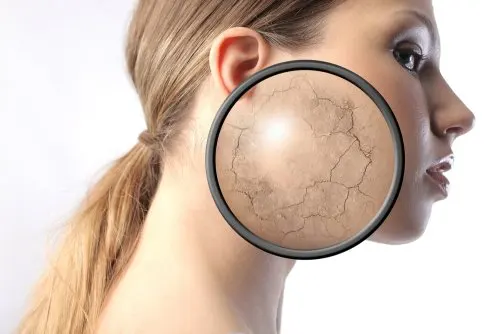
Normally, these cells grow in deep layers of the skin and rise to the surface once a month. However, in people with psoriasis, it happens abnormally fast. This can cause some of the following symptoms:
- Dry, silvery skin, covered with scales
- Itching
- A pink or red skin tone
- Raised and thickened skin
- Joint pain (occasionally)
- Changes in the nails may also appear (they may become a little thicker and yellowish in color, with small dimples)
- Abundant dandruff on the scalp
Also, unfortunately, psoriasis is often a chronic disease. In fact, according to experts, it can be passed from parent to child.
Psoriasis diet: What foods should I avoid if I have psoriasis?

Once you know the difficulties that you will have to go through if you suffer from psoriasis, you only need to know what you can do so that its symptoms don’t worsen even more. For this not to happen, you should avoid, as far as possible, eating the following foods:
Foods that increase the production of cytokines
Red meat
It’s believed that red meat is a food that can worsen psoriasis lesions, as it can increase the number of cytokines and aggravate the symptoms of psoriasis.
However, in research published in the Neuronum Journal, the researchers actually discovered that “no studies were found that evaluated the suspension of red meat from the diet that would allow to conclude clinical changes in psoriasis.” Therefore, this may not necessarily help, although it’s worth keeping in mind.
Psoriasis diet: Avoid milk
Drinking milk also increases the amount of cytokines. In addition, it has casein, a milk protein that causes the body to produce histamines, so it is, in general, something that should be avoided.
However, there are no recent studies that support this information, so we recommend asking a medical specialist before making any changes in your lifestyle habits .
Coffee and processed foods

Both coffee and processed foods increase the production of cytokines, so it’s always advisable to give them up for better health, as recommended in the aforementioned research published in the Journal Neuronum.
Psoriasis diet: Eat fish in moderation
If we want to consume fish, we can. However, we should not exceed 115 grams twice a week. The biggest problem with this food is the presence of toxic mercury in some species. If you’re sure where the fish comes from and that it’s healthy, you can eat it.
However, this study published in Dermatological Therapeutic Activity states that “the intake of fish oils containing omega 3 polyunsaturated fatty acids involved in the metabolism of leukotrienes can help improve psoriasis.” Therefore, the key is simply ensuring that the fish you’re eating is healthy and doesn’t contain heavy metals.
Avoid gluten, corn, and sugar
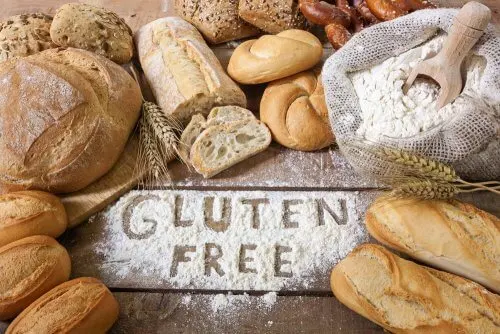
This publication of Naturopathic Medicine notes that gluten-free diets have produced improvements in patients with psoriasis. However, we recommend that you consult a doctor before making any changes to your lifestyle. That way, you can determine whether or not he or she prescribes the elimination of gluten from your diet.
Similarly, corn, corn oil and corn syrup (fructose) often have inflammatory components, so you should try to consume them in a balanced way, although there is not enough scientific data to conclude that this is the case.
Sugar also tends to reduce the body’s immune function, so try to only consume it in a very balanced way.
Like this article? You may also like to read: Psoriasis and Coronary Heart Disease: How Are They Related?
Psoriasis diet: Forget alcohol
According to several studies, alcohol can be a triggering factor in psoriasis. Try to cut down or even avoid it altogether if you want to improve your psoriasis.
What foods can help me with psoriasis?
Anti-inflammatory vegetables and fruits
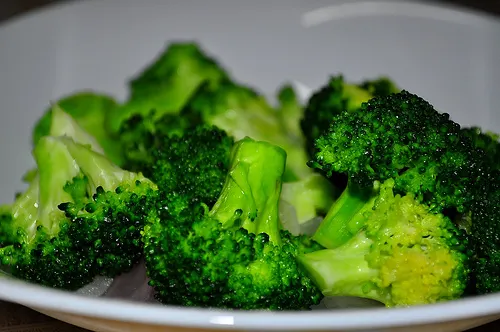
Studies on psoriasis often conclude that consuming fruits and vegetables with vitamin C, beta-carotene and other antioxidants can help increase the resistance of the immune system, promoting a better course of the disease.
So which vegetables are the most suitable? Look at the following list and choose the ones that are to your liking!
Psoriasis diet: Fruits and vegetables
In the case of vegetables, carrots, artichokes, broccoli, Brussels sprouts, cabbage, and cauliflower are all advisable. We can also consume onions, spinach, turnips, or zucchini.
As for fruits, the most recommended to help us against psoriasis are apricots, pumpkin, and mangoes.
Essential whole grains
Amaranth, quinoa and buckwheat can become great allies against some symptoms of psoriasis. They’re very helpful to our cardiovascular health. In addition, they’re rich in flavonoids, nutritious, gluten-free, and have essential amino acids.
If you can’t find them in your usual supermarket, try to look for them in specialized stores such as health food stores.
Blue fish
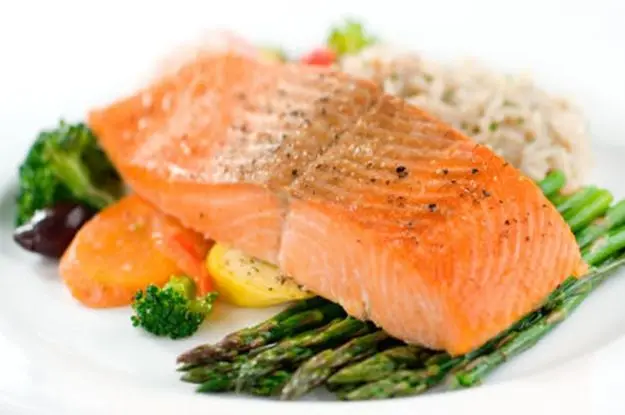
Tuna, salmon, herring, lake trout and sole are wonderful sources of omega-3 fatty acids.
According to the University of Maryland Medical Center, omega-3 fats can help relieve the pain, inflammation, and redness associated with psoriasis. Be sure to include them in your diet!
Psoriasis diet: The importance of digestive enzymes
In addition to taking into account the properties of the foods we have indicated, you should know that the pancreas and other glands produce basic digestive enzymes for our body, since they are proteins and we need them to fulfill our vital functions.
However, sometimes these organs don’t produce them in sufficient quantity and we must get them from food. The main problem is that food often loses these essential enzymes during cooking.
People who don’t suffer from psoriasis usually get around 25% of the enzymes they need. On the other hand, those who do suffer from psoriasis usually don’t have enough HCL in their stomach – i.e. the enzymes that are so necessary for our health.
Therefore, as much as possible, it’s always advisable to eat raw food, such as vegetables.
You may also like to read: Five Ways to Keep Psoriasis at Bay
Things to keep in mind
As you’ve seen, there are foods that can help you with some symptoms of psoriasis, while others can aggravate them.
Follow our advice, but remember that this advice is only a supplement! You should always consult a specialist, as psoriasis is a very serious problem for your health.
All cited sources were thoroughly reviewed by our team to ensure their quality, reliability, currency, and validity. The bibliography of this article was considered reliable and of academic or scientific accuracy.
- França, K., & Jafferany, M. (2016). Psoriasis. In Stress and Skin Disorders: Basic and Clinical Aspects. https://doi.org/10.1007/978-3-319-46352-0_21
- Griffiths, C. E., & Barker, J. N. (2007). Pathogenesis and clinical features of psoriasis. Lancet. https://doi.org/10.1016/S0140-6736(07)61128-3
- Meurer, M. (2009). Psoriasis. Der Hautarzt; Zeitschrift Für Dermatologie, Venerologie, Und Verwandte Gebiete. https://doi.org/10.1007/s00105-009-1727-z
- Rapp, S. R., Feldman, S. R., Exum, M. L., Fleischer, A. B., & Reboussin, D. M. (1999). Psoriasis causes as much disability as other major medical diseases. Journal of the American Academy of Dermatology. https://doi.org/10.1016/S0190-9622(99)70112-X
This text is provided for informational purposes only and does not replace consultation with a professional. If in doubt, consult your specialist.








